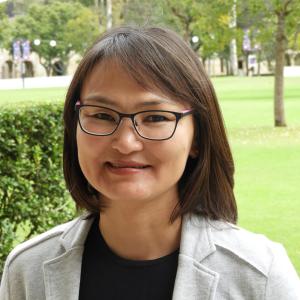Women stand at the frontlines of the COVID-19 crisis in Mongolia. Women are healthcare workers and food producers, caregivers and teachers, social workers and civil servants.
In Mongolia, women make up 82 per cent of all healthcare workers who risk their health every day to care for those affected by the virus. Mothers across the country have also held the line and ensured that children are healthy, educated, and socialized amidst the crisis even as they faced their own challenges. On International Women’s Day 2021, the UN aims to celebrate the significant contributions made by women and girls during the pandemic with the theme “Women in Leadership: Achieving an Equal Future in a COVID-19 World”.
Yet, we must also acknowledge that women and girls continue to bear the brunt of the pandemic. While the strict measures put in place by the Government helped avoid widespread outbreaks and high death tolls, these same measures have worsened the already deep inequities that women and girls face, backtracking on years of progress made toward gender equality.
Women are more likely to work in sectors struggling the most during the pandemic, including micro, small and medium enterprises and the informal economy. Women are also more likely to drop out of the labour force during this crisis.
Herder women face greater constraints than men in accessing productive resources, services, technologies and financial assets despite the major role they play in food production and food security. These vulnerabilities are further compounded by the socioeconomic impacts of COVID-19.
Unpaid care work has increased exponentially due to school closures and lockdowns and the burden disproportionately falls on women and girls. This added responsibility interferes with their work, their education, and their self-care and personal development during an already challenging time.
Lockdowns and quarantines have made access to social and medical services far more difficult, especially for pregnant women and women with disabilities. Maternal mortality in Mongolia increased by 28 per cent during this period, with 22 per cent of these deaths linked to the disempowerment of women and pandemic-related concerns.
Gender-based violence – including domestic violence, violence against children, trafficking and sexual exploitation – spiked throughout the pandemic. For the first time in years, the country saw a 16 per cent increase in the number of serious cases of domestic violence, a statistic that had previously been steadily declining over time.
Throughout the world, we witnessed the power of women’s leadership in COVID-19 response and recovery. Countries led by women have shown great success in achieving lower transmission rates while protecting the socioeconomic wellbeing of their people. Experience has also shown that good governance, democracy, peace, and development all require inclusive leadership and representation to be effective and long-lasting.
However, stark gender imbalances remain in decision-making processes in the country. Women only hold 13 seats (17 per cent) in Parliament, and despite representing the majority of healthcare workers, only 3 of the 26 members (12 per cent) of the State Emergency Commission are women.
As the country responds to and recovers from the devastating effects of the pandemic, we are offered a valuable opportunity to bring about gender equality, especially for women’s leadership.
The UN calls on the government, the private sector, civil society and other institutions to act now to make gender equality and women’s empowerment a reality. We must dismantle the structural barriers and change the discriminatory norms that hinder women from fully participating in public life, in the economy, and in decision-making. At the same time, we must also ensure that critical and lifesaving support to women and girls is available and accessible to address the problems they face today in the context of the pandemic so that they are empowered to be active participants and drivers of Mongolia’s development.
We can achieve this by ensuring equal representation through special measures and quotas; by empowering women to take full part in the economy through equal access to the labour market and productive resources and opportunities; by creating a society where women and girls can live and work without fear of violence through funding, policies and political will to end all forms of gender-based violence in public and private spaces; and finally, by working at the grassroots level to change mindsets and social norms to espouse more gender equitable values.
Together, let us all build Mongolia forward better.







